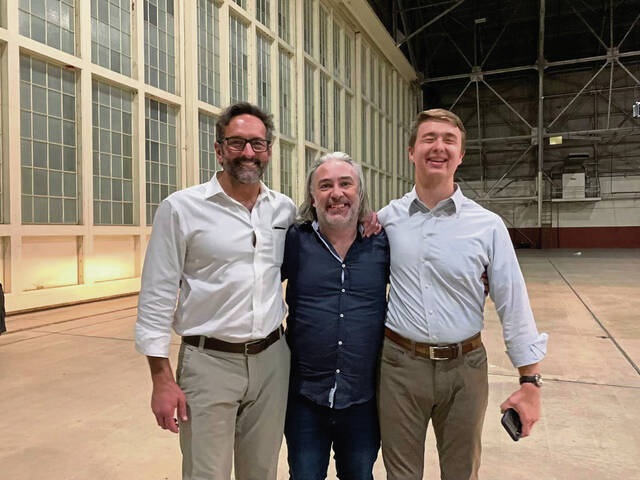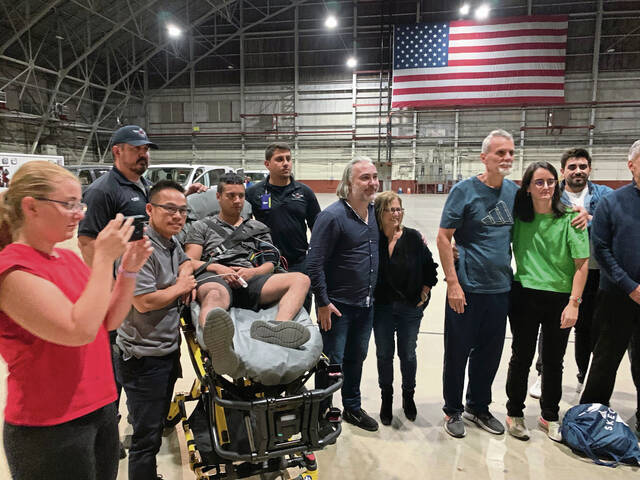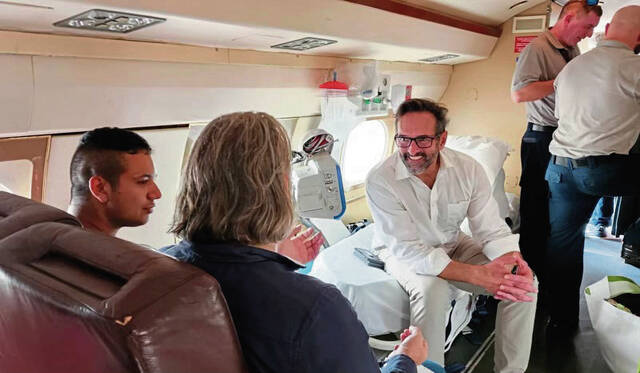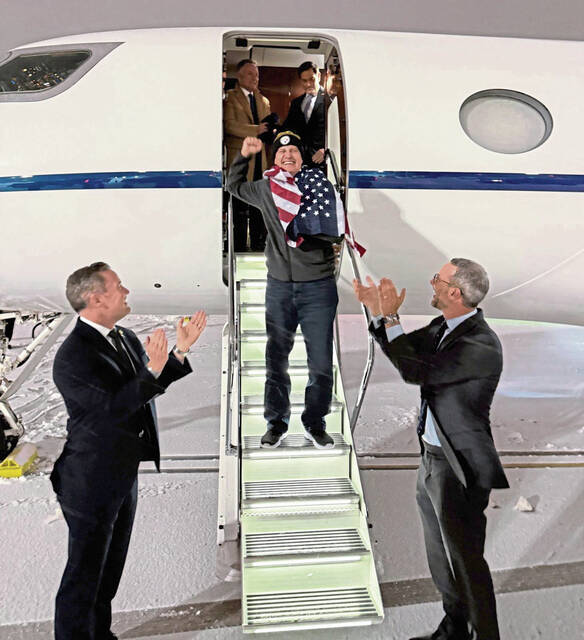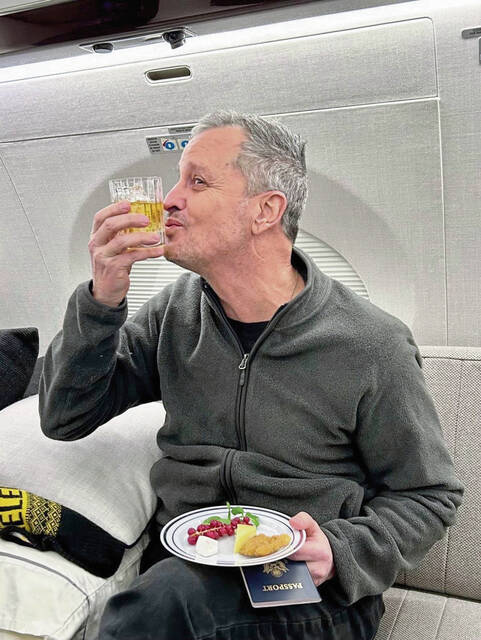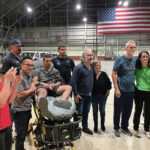Matthew Heath, who was imprisoned in Venezuela for two years, has an idea of what Marc Fogel went through during his captivity in Russia.
But Trevor Reed lived it.
Heath and Reed, both arrested on sham charges and held for years by a foreign government, spoke with TribLive this week about their experiences in captivity and what Fogel will likely face in coming months as he takes his first steps readjusting to life as a free man.
The former Oakmont teacher was flown on Wednesday to Brooke Army Medical Center at Fort Sam Houston in San Antonio, where he will receive medical treatment, mental health therapy and debriefing, known as “Post-Isolation Support Activities.”
It’s the same place where more prominent detainees, like WNBA star Brittney Griner and Wall Street Journal reporter Evan Gershkovich, both former prisoners of Russia, went for treatment.
Held initially in Moscow and then moved to a penal colony hours away, Fogel spent three-and-a-half years in Russian custody after he was arrested for taking marijuana that had been prescribed for pain into the country.
U.S. Special Envoy Steve Witkoff flew to Russia on a private jet and negotiated Fogel’s release.
They flew back to Joint Base Andrews in Maryland on Tuesday night, and an hour later, met with President Donald Trump in the Diplomatic Reception Room at the White House.
On Wednesday, after spending his first night home at a Washington, D.C. luxury hotel, Fogel flew to Texas to begin the process of reintegrating into American society.
“There might be times when years after the case, where memories come up,” said Liz Cathcart, the executive director of Hostage US, a nonprofit that works with freed Americans and their families.
But, she added, “People recover from this and go on to live very good lives.”
‘They said they would break me’
Reed, 33, a former Marine who grew up in Texas, was in Moscow in the summer of 2019 visiting his Russian girlfriend when he was arrested after a night of drinking.
Although he expected to be released the next morning, agents from the Federal Security Service, or FSB, instead accused him of assaulting two police officers. He was tried, convicted and sentenced to serve nine years in a Russian labor camp.
Reed was moved to Mordovia, a camp built just after World War II about 300 miles from Moscow.
The conditions there, he said, were worse than those he’d been held in during his pre-trial detention. The prison is so isolated, Reed said, that the guards get away with whatever they want.
They tried to force him to work, but he refused.
“I was angry I was in there to begin with,” Reed said. “I said, ‘I didn’t break any of your laws, and you put me in prison anyway.’ They said they would break me, and I said, ‘nah, you won’t.’ ”
And they didn’t.
But it meant that Reed spent a great deal of time in solitary confinement, spooning with a hot water pipe to try to keep warm through the frigid Russian winter and spring.
Although the guards gave him a jacket, Reed said he wasn’t allowed to wear it in his cell.
“They’re trying to use the cold as a weapon against you,” he said.
The prison facility was dilapidated, Reed said, with walls and fences collapsing, sheet metal peeling off the buildings and electrical poles and guard towers leaning over.
Reed said that he was fed regular meals, but they were so terrible that he went from 180 pounds to under 120.
“It felt like, no matter how much you ate, you’re still losing weight.”
Breakfast was regularly some type of grain floating in water. Lunch, he said, was a mystery meat patty with beet salad and potatoes, or a mystery meat patty with potato salad and beets.
Dinner every night was fish – usually a sardine or what is called “salt fish.”
“Imagine a pepperoni of fish – a thick slice,” he said, “like a sushi roll.”
But the fish still had its spine and wasn’t cooked thoroughly because it had been cured in salt water.
“I ate it because I was starving, but most prisoners didn’t, and even the other Russian prisoners wouldn’t,” Reed said. “It’s really difficult to swallow.”
There were also what they called crabby patties, made out of fish, which would frequently take him an hour to eat because he had to pick out the bones.
“The food was pretty terrible,” he said.
Although Reed should have been receiving clean, boiled water to drink in his cell, he did not. He drank tap water that smelled of sulfur.
Among the struggles he faced, Reed said he wasn’t allowed to write letters in English to his loved ones.
“I had to learn Russian really quickly,” he said.
Reed met with the U.S. ambassador to Russia a handful of times and was allowed to meet with his Russian lawyers when they asked to see him.
The U.S. Embassy also sent staff to check on him, and Reed was permitted to meet occasionally with his girlfriend and father before he was moved to the labor camp.
Just a few days before his release on April 27, 2022, Reed said he was moved to an FSB prison, where they started feeding him normal amounts of much better food.
The invasion of Ukraine had occurred just a couple months before, and Reed said he worried that Russia was fattening him up.
“I thought they were going to kill me to send a message to the U.S.,” he said.
But they didn’t.
Instead, they released Reed in a prisoner exchange. The United States gave up Konstantin Yaroshenko, a Russian pilot serving a 20-year federal prison sentence for cocaine smuggling.
“It felt surreal – like it wasn’t really happening,” Reed said. “I was sure I’d wake up on the floor in solitary confinement at some point and think it was all a dream.”
El Tigrito
Matthew Heath, a former U.S. Marine, was wrongfully detained in Venezuela on Sept. 11, 2020, on his way to Aruba to visit friends.
Heath, 43, of Knoxville, Tenn., was in a taxi when he was stopped at a military checkpoint, he said.
As soon as he showed the officers his American passport, Heath was immediately detained and accused of working for the U.S. government.
Venezuelan officials said Heath was plotting an attack on their energy infrastructure and tried him for terrorism and treason.
“It was awful,” Heath said. “You’re in so much trouble, it’s beyond your ability to resolve the problem. The only people that can help you are the president, the national security advisor and the secretary of state.”
He remained there for more than two years, held captive in a Caracas prison known as La Casa de los Sueños — the House of Dreams.
Heath said that prisoners were regularly tortured, and there were constant human rights violations. He was hospitalized twice for injuries inflicted on him by the guards.
For much of his two years of captivity, like Reed, Heath was kept in solitary confinement.
The prison, itself, constructed inside a parking garage at Venezuela’s domestic law enforcement headquarters, was cramped. It didn’t meet any human right standards, he said.
One of the things prisoners feared most there, he said, was El Tigrito, or the little tiger.
It was a room the size of a broom closet where prisoners would be punished. It was too small to sit down. There was no food, no water, no light.
“Just the threat of it would change behavior,” Heath said. “I was sent there six times. I was not a model prisoner.”
Heath used his Marine training — he served from 1999 to 2003 — to resist.
“You look for the small victories,” he said. “Whatever they wanted, I would do the opposite.”
He broke the surveillance camera in his cell — and every one his captors placed there after.
“They eventually stopped putting cameras in my cell,” Heath said.
Even though conditions were difficult, Heath said he had only two brief moments of despair during his 753 days of captivity.
“I had an unshakeable faith in the United States government,” he said. “I wasn’t happy, but I had a very strong confidence the U.S. government was not going to leave me behind.
“The challenge was to have patience until the political stars aligned.”
Eventually, the stars came together.
Around 6 a.m. on Oct. 1, 2022, Heath was awakened and told he was going home.
“I told them to get out of my room and let me sleep. ‘Get out of my cell,’ ” he said. “I didn’t believe them.”
But it was true.
Heath and six other detainees were traded back to the U.S. for two nephews of Venezuelan President Nicolas Maduro. They had been imprisoned in America for drug trafficking.
“I was in shock,” Heath said. “You can’t believe that the nightmare has come to an end.”
He and the others were flown to the tiny island of Canouan in the Caribbean around noon. As they sat on the plane waiting, then-U.S. Special Presidential Envoy for Hostage Affairs Roger Carstens landed with Maduro’s nephews.
The countries exchanged prisoners.
“The whole time I was walking, I kept thinking they were going to grab me and drag me back,” Heath said.
But finally, he was on the American plane. By 11 p.m., he arrived at Fort Sam Houston.
Fogel has not publicly discussed his release in detail beyond comments made at the White House. But his journey also involved an abrupt exit and a plane ride home.
“They came and pulled me out, I had a mask on, I couldn’t see where I was going, and they were moving me,” Fogel told a presidential entourage moments after he met Trump on the South Lawn of the White House. “There was a point, I think it was today … they brought me my clothes.”
Earlier, the U.S. government had released a photograph of Fogel aboard Witkoff’s private jet, holding a glass to his lips and a plate of cheese and grapes in his hand.
‘Soft landing’
When both Heath and Reed returned to the United States, they were flown to Brooke Army Medical Center for Post-Isolation Support Activities.
Those include debriefing, a thorough medical examination, mental health care and practical assistance, as well as dealing with financial and legal concerns, said Cathcart, of Hostage US.
“It’s focused on providing a soft landing,” she said.
A U.S. State Department spokesman said that the program was created by the Department of Defense for soldiers who were held hostage, and then adapted for wrongful detainees.
Although it is not required for people returning to participate in it, it is strongly recommended, the spokesman said, especially if the person was held for a lengthy period of time.
Reed said he initially did not want to participate in the program, but his parents pushed him.
“I’m really glad I did,” he said.
Heath said the same. He described his time there much like any regular hospital stay. Patients have their own rooms and are kept away from others to guard their privacy.
“They bring you the not-great food,” Heath said. “But it tasted like a million bucks because it was in freedom.”
The staff, he said, was amazing.
“It was one of the most professional experiences I’ve ever had in my whole life,” he said. “They cared.”
Reed, too, was complimentary of the staff. And he liked the food, he said, because the nurses ordered him steak every day.
At first, he said, he was overwhelmed by the menu and food choices. Reed hadn’t picked his own meal for years, so he asked the staff to do it.
But, eventually, he said, they made him order so that he could get used to having choices again and free will.
The staff also took Reed to the grocery store and shopping for a belt so that he could get used to being around other people in a public place.
In the early days, both Reed and Heath said, there were a lot of medical appointments with specialists and medical tests.
Immediate physical challenges facing some returned prisoners can include malnutrition, vitamin deficiency and muscle wasting, Cathcart said.
During his battery of medical tests, Reed learned he’d developed kidney stones during his imprisonment.
He had been worried about tuberculosis because he had been coughing up blood for months, but Reed was cleared of that. He did, though, have a bacterial infection in his lungs.
He also had a broken rib that never healed properly — and still randomly sticks out of his chest.
Heath said he didn’t have much in the way of physical problems.
“I was in pretty good shape,” he said. “I was very eager to go home.”
But there was also a lot of mental health care. Heath said he both had individual and group therapy sessions.
“What really helps the most is talking about what happened,” Reed said. “I thought that was a really important part of the course.”
Released detainees learn about stress reactions and coping skills, Cathcart said. Some people also have post-traumatic stress disorder, Cathcart said, though not always.
“Some folks inherently have resiliency skills — or build them in captivity,” she said.
While he remained at Brooke Army Medical Center, Heath said, his mother and aunt stayed in VIP housing on Fort Sam Houston.
“It was the nicest housing I’ve ever seen,” he said. “If it was a hotel, it was a five-star hotel.”
In addition to working with the returnees, the government provides services for family members, too.
Changing family dynamics can impact a prisoner’s return, Cathcart said.
“Your family will have continued their life without you,” she said. “So coming home can be emotionally challenging — to figure out what that looks like moving forward.”
Sometimes, the roles in the family have to be re-evaluated.
“Oftentimes, the family needs continued support because they’ve gone through years having this traumatic thing happening to them,” she said. “It’s a big switch for families and a really challenging one.”
Reed said that, for some, the program staff restricts time with family in the early days, limiting visits to just 10 or 20 minutes.
They add additional time gradually until the end of the program when the returnee can go on base to visit or go to the bowling alley for an outing.
“Initially, I thought ‘that’s stupid,’” Reed said.
But then, he realized, it did help.
“All of your emotions are not back in the same place they were before,” Reed said. “After a short period of time, I noticed I don’t have the same feelings as I used to.
“’Is something wrong with me?’” he wondered.
Filling the gaps
Once a detainee is released from Fort Sam Houston, most government intervention ends.
The State Department spokesman said that the special presidential envoy for hostage affairs is authorized to provide wrongful detainees up to five years of medical services. Funding has been approved, according to the State Department, but the mechanism to allocate it is still being worked out.
“From a service side, the practical side,” Cathcart said, “Hostage US fills that gap now.”
The group is the only entity in the country providing continuing services to returned prisoners, she said.
Founded in 2016, Hostage US said an estimated 200 Americans are taken hostage overseas every year.
“We are here to help families survive this terrifying ordeal and help former hostages rebuild their life after captivity,” according to the group’s website.
“There’s a massive gap from when the government support ends,” Cathcart said.
For the returnees, Hostage US provides a coach to help them with initial coping skills and then matches them to a therapist trained in trauma, Cathcart said.
Her organization currently provides services to 40 clients, including families with a loved one still missing.
About 70% of their clients are returned prisoners.
Heath said that after he returned to his home in Knoxville, he lived with his dad.
“I didn’t function very well for the first three or four months,” he said. “I’m not sure I could have taken care of myself.”
The adjustment was jarring — and that was outside of the financial repercussions Heath faced with canceled bank accounts and credit cards. His vehicle was repossessed.
“The readjustment process is like you come back from the dead,” he said. “You have to restart everything.”
A few months after Reed returned home, he said, it seemed like he had plateaued.
“I felt like I wasn’t going to get any better,” Reed said.
What he needed, he continued, was to get back at Russia. During his imprisonment — and after Russian invaded Ukraine — Reed had thought about joining Ukrainian forces to fight. On Nov. 2, 2022, that’s what he did.
Reed fought for nine months. He was wounded, taking shrapnel in both of his legs. But he said he has no lasting injuries and was glad he went to fight.
“I didn’t feel like myself until I went to Ukraine and got revenge,” Reed said. “I really felt a strong sense of injustice. The Russian government did this, and they got away with it. There were no repercussions for it. There were no sanctions.
“To me, it’s like Russia took three years of my life,” he said. “That was something I needed to fix for myself.”
In a video on the Hostage US website explaining the group’s work, Amy Manson, a founder of the organization, described the challenges associated with suddenly going from confinement to freedom.
“We at Hostage US find that returning hostages probably struggle most with returning to normal,” Manson said. “How is life normal when you have been psychologically abused? You may have suffered malnutrition. You may have muscle wastage. You’ve had a near-death experience, and so how do you return to normal?”
Since his release, Heath, who works as a security consultant, began volunteering with Hostage US. He hopes to prevent what happened to him from happening to others. It also gives him a sense of purpose.
“I don’t let my detainment define me. It’s not who I am. I’m a father. I’m a veteran. I’m a proud U.S. citizen.”
In January 2024, 16 months after his release, Heath said he had an epiphany.
“It struck me how happy I was, how much my life had improved,” he said. “It’s easy for me to have a good attitude because I have so many blessings in my life.”
Both Heath and Reed said they followed Fogel’s story.
“I want to send my good wishes,” Heath said. “I’m really, really happy for him and his family.”
Reed hopes the president will continue to work to bring home those who are wrongfully detained around the world.
“Getting Americans home, I don’t think, is something political,” he said. “It gave me a lot of hope maybe he’ll continue to do that.”



